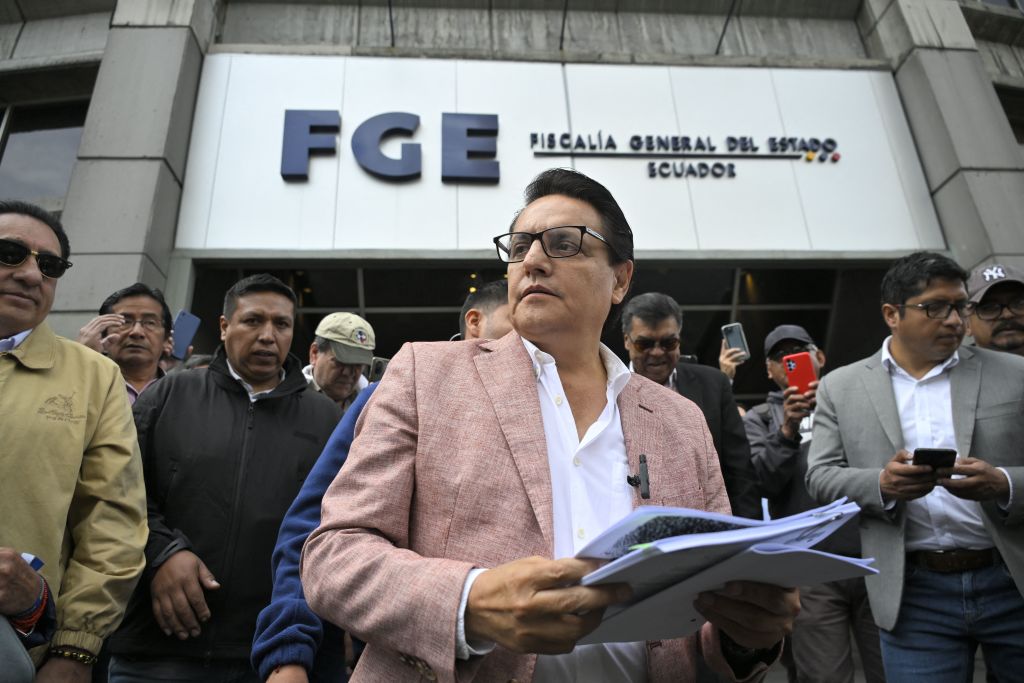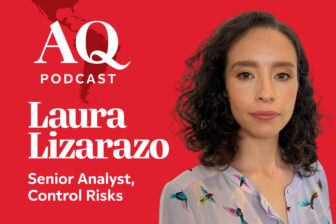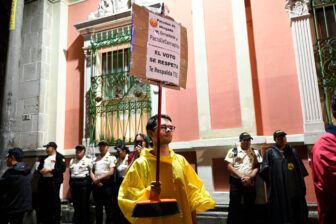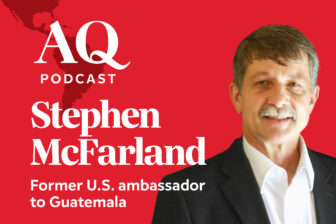Additional comments incorporated below.
Presidential candidate Fernando Villavicencio was shot at a campaign event in Quito on August 9. One suspect was killed in the ensuing shootout with police and nine other people, including two police officers and a National Assembly candidate, were shot. It was the first time in Ecuador’s history that a presidential candidate was assassinated.
The event shook the country as it prepares to hold general elections on August 20. Drug-related crime and violence has been surging in Ecuador for years, and Villavicencio, a former journalist, was one of the country’s most outspoken presidential candidates on the issue.
AQ asked observers to share their reaction to the events. We will update this page as developments arise.
Sebastián Hurtado, president of Prófitas, a political risk consultancy
Crime, a major concern among Ecuadorian voters, was already a focal point of the upcoming presidential elections. The unprecedented assassination of presidential candidate Fernando Villavicencio is likely to shake up the election’s dynamics significantly.
This shocking event could weaken political forces that have traditionally opposed Villavicencio, particularly the left-leaning correístas, who have been in conflict with him for years. They now face increased scrutiny and criticism. Luisa González, the correísta presidential candidate, has consistently led in the polls and it seemed she might win the election outright in the first round. Now, in light of yesterday’s assassination, she may find the race more challenging. An intensely competitive second-round election has suddenly become more likely. (If in the first round no presidential candidate receives more than 50% of the vote, or a combination of 40% of the vote plus a 10-point lead over the second-place finisher, a second-round runoff will be held on October 15.)
Right-leaning candidates known for their anti-correísta stances and crime-fighting credentials, such as Otto Sonnenholzner and Jan Topic, might see a boost in support. Recent polls had indicated that these two candidates and Villavicencio were essentially tied for second place within the margin of error. Topic, known for his hardline security stance, may stand to gain the most from an increased public demand for tough action on crime. However, Villavicencio’s name and image will likely remain on the ballot, and votes for him will go to a candidate to be selected by his party. This will limit the additional votes that Sonnenholzner and Topic can gain.
President Guillermo Lasso, who has already been criticized for failing to address the burgeoning security crisis, will likely come under even greater scrutiny. Calls for his resignation are to be expected, and an ongoing impeachment process may resume once the new National Assembly reconvenes after the elections. Moreover, the brazen nature of the assassination, carried out in broad daylight despite substantial police protection for Villavicencio, exposes alarming questions about the level of infiltration of Ecuador’s security forces by organized crime. The ramifications of this tragic event are multifaceted and complex, and they are likely to leave a lasting imprint on Ecuadorian politics and policy for years to come.
Camila Ulloa, coordinator of democracy, transparency and citizen participation at Grupo Faro
Ecuador is grappling with an unprecedented surge in insecurity and violence. Since 2018, the country’s once-strong reputation as one of the region’s safest havens has crumbled, and 2022 was the most violent year in its history. Alongside a fivefold increase in violent deaths over the past five years, 2023 has now seen unprecedented levels of political violence.
In the lead-up to this February’s local elections, the assassinations of two mayoral candidates sent shockwaves across the country, and several candidates fell prey to violent attacks. The mayor of Manta was assassinated in July, and the current electoral cycle has been darkened by two homicides: first, the killing of Rider Sánchez, a candidate for the National Assembly, and most recently, the untimely demise of presidential candidate Fernando Villavicencio.
This somber tableau significantly shapes the course of this election. The debate and the political agenda will increasingly revolve around the theme of insecurity and violence, and the campaigns in these last days will focus on providing solutions to this problem. Electoral results could also be influenced by this dynamic, favoring candidates with strong “mano dura” discourses.
These unfolding events have an impact on the electoral process because campaigns will not be able to be conducted openly and freely, without the guarantees to exercise the political right of being a candidate and the citizens’ right to be informed. The violence also carries profound implications for the foundations of Ecuadorian democracy.
On the one hand, the escalating levels of violence and public insecurity render the state incapable of providing the necessary guarantees to conduct a regular democratic process. These circumstances also hinder civic engagement, pushing citizens to retreat from spheres of social and political participation. Perhaps most significantly, a growing inclination to adopt authoritarian tendencies has established itself within the population, intensifying a wave of distrust towards institutions and legal frameworks. This occurs because citizens lack the institutional support to exercise their rights freely, seeking swift alternative actions that can restore their sense of security.
Will Freeman, fellow for Latin America studies at the Council on Foreign Relations, columnist for Americas Quarterly
When I was last in Ecuador, in May, an advisor to the Foreign Minister told me, “In ten years, this could be a failed state.” It struck me as hyperbole—at the time. Maybe not anymore. If not a failed state, then Ecuador has already advanced disturbingly far down the path to becoming a narco-state. It’s not that we have evidence that the highest levels of government are complicit, as they were in Honduras under former President Juan Orlando Hernández. But there have been signs of complicity and collusion by officials in the prison system, police, armed forces and judiciary. You can’t understand Villavicencio’s killing—or the murder of other recently-slain politicians—without that context. Impunity is becoming the norm.
We don’t yet know who is behind the killing, although an unverified video shows leaders from Los Lobos—one of the country’s largest gangs—claiming responsibility. A thorough, independent investigation must explore the failings of Villavicencio’s government-provided security detail to protect his life. Right now, there are lots of pieces that don’t add up. Why was Villavicencio placed in a normal car, not the bullet proof one that was coming for him? Why didn’t the security detail join him inside the car? What we do know is that Villavicencio said he received death threats from the jailed leader of los Choneros—Ecuador’s other largest gang—for his anti-corruption and anti-crime proposals.
Promising to investigate state corruption and collusion with organized crime put a target on Villavicencio. Ecuador’s political leaders must now take inspiration from his boldness to confront these issues. If they do not, impunity and its many consequences will become only more difficult to uproot.
This article was updated on August 10, at 1:55 pm EST, to incorporate additional comments in paragraphs 11 and 12.







